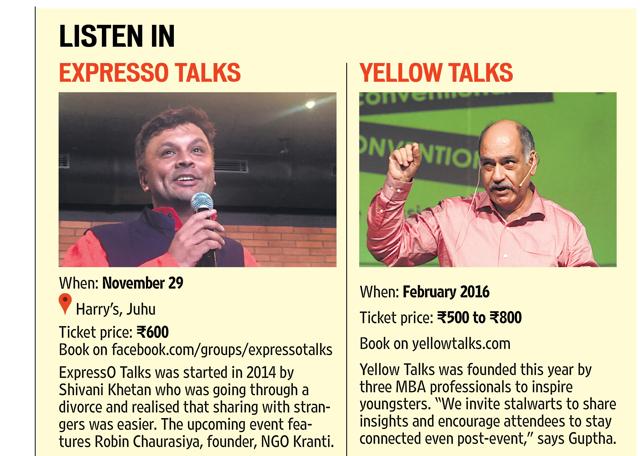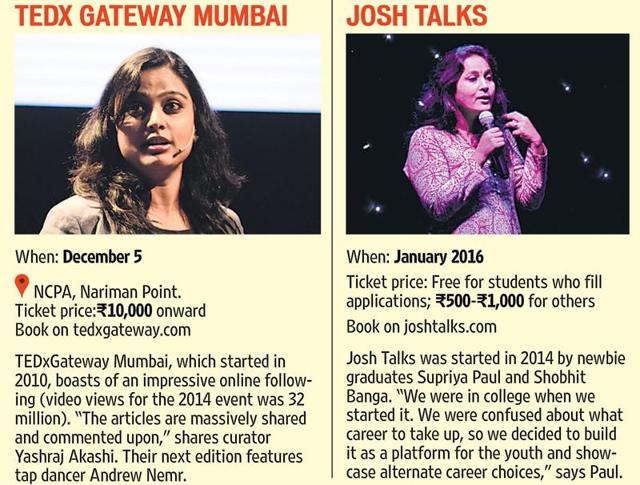Talk like TED: Why are motivational talks gaining popularity?
In 1984, the first TED (Technology, Entertainment, Design) conference was held at the Monterey Conference Center in California.
In 1984, the first TED (Technology, Entertainment, Design) conference was held at the Monterey Conference Center in California. The invite-only event featured a demonstration of the compact disc (CD) and the e-book, futuristic ideas for the time. Yet, the event didn’t find many takers or make much money. But the next edition, which took place after six years, went on to spawn a global phenomenon.

TED talks, especially the more recent online videos, were frontrunners for other inspirational talks and warmed audiences to the concept. It was only a matter of time before others followed the model: get real-life heroes as speakers to recount their journey and offer tips to people who seek inspiration.
While the TEDxGateway, licensed by TED, is one of the earliest talks held in Mumbai (2010), the last two years have seen a few more find place in the city’s cultural calendar. It includes ExpressO Talks, Yellow Talks, INK Talks and Josh Talks.
What is the appeal of such talks, though? For one, the talks (often by renowned speakers) are smartly packaged into personal stories and offer a bird’s-eye view of various topics, be it the future of flying robots, or why we laugh. So, there is something for everyone. And the online videos are accessible to all.
“Such talks cater to people who are curious and want to be aware of innovations. Information is provided in the form of content-rich, short talks that have a lot of impact. It fits the psyche of people who want to get more in a short time,” says life coach and psychotherapist Khyati Birla, who avidly watches TED videos online.

With so many talks lined up, there are chances that one might spot the same speaker at various events. But the organisers maintain that there is space for everyone and, far from diluting the scene, more talks mean greater awareness. “It helps in creating a culture of exploring new horizons instead of dilution,” says Abhinav Guptha, founder of Yellow Talks. He gamely admits that TED has been a model for Yellow Talks, though their focus on the mentor-mentee relationship (a mentor can be approached for guidance, even post event) makes them different.
Similarly, Shivani Khaitan, founder of ExpressO Talks, emphasises that they focus on experiences vis-à-vis ideas. “I want to give people an opportunity to listen to those who have persevered and can be an inspiration,” she says.
There have also been concerns about the quality of TEDx events in other cities (in 2012, TED withdrew the licence for TEDx Chennai for irregularities). And the superlative prices of some of the events also raises eyebrows
(Rs 75,000 for INK talks; Rs 10,000 upwards for TEDxGateway). “The high cost involved created a market for affordable talks,” suggests Supriya Paul, founder of Josh Talks. Some of the organisers even offer subsidised tickets to students.
Though at a nascent stage, the talks have their share of fans. Ravi Prasad (30), an account manager at an advertising agency, walked out inspired after attending a Yellow Talks session by animator Abhijeet Kini in May: “Kini spoke about working at an ad agency until he formed a start-up with his wife. I am waiting for my ‘not anymore’ moment,” he shares.

Noopur Desai, CSR director, Apar Foundation, has attended TEDx Gateway events since 2013. At a session, she met Shashank Mani Tripathi, chairperson of Jagriti Sewa Sansthan. It led her to attend the Jagriti Yatra, a journey which takes people across India to foster entrepreneurship. “On this trip, I witnessed the energy of the people and felt connected,” she shares.
Sometimes, fans turn into speakers, as it happened to music band MaatiBaani. “Conferences like these prompt you to take action and show how ideas can make a difference,” says singer Nirali Kartik.






